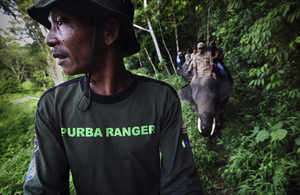UK boosts fight against illegal wildlife trade
UK announces £10 million to end wildlife trade and improve other economic opportunities.

Forest rangers on patrol in Indonesia. Picture: Abbie Trayler-Smith/Panos Pictures/DFID.
The Department for International Development (DFID) and the Department for Environment, Food and Rural Affairs (DEFRA) have joined forces for the first time in the fight against international wildlife crime. Justine Greening and Owen Paterson have announced today a £10 million DFID funded package to support efforts by the UK and other countries to tackle illegal trade in wildlife products including rhino horn and elephant ivory.
The illegal wildlife trade is a multi-billion pound activity which promotes corruption, damages tourism opportunities and undermines economic growth in some of the world’s poorest countries. Heavily armed poachers and organised criminal networks are destroying some of the world’s most iconic species and posing a threat to security in rural African communities.
The UK is playing a leading role in efforts to end the illegal wildlife trade and will hold an international conference next February, to be hosted by the Prime Minister in the presence of His Royal Highness the Prince of Wales, to work with our international partners to spur action to combat this growing threat.
Funding will be awarded to support action in developing countries including on:
- reducing the opportunity and incentive to poach by improving economic opportunities and promoting security and good governance
- providing training and access to better equipment and practical support to agencies in their efforts to address the illegal trade
- reducing demand for illegal wildlife and animal products such as elephant ivory, rhino horn, and tiger parts by raising awareness of the impacts and economic losses caused by wildlife crime.
International Development Secretary Justine Greening said:
“By working with DEFRA to tackle the illegal wildlife trade we are helping to improve the economic opportunities of the poorest people whose livelihoods depend on natural resources. DFID carries out significant work tackling corruption and illicit flows from developing countries and this fund will also help stop the corruption fuelled by the illegal wildlife trade.”
Environment Secretary Owen Paterson said:
“Poaching devastates livelihoods and sustainable communities as well as endangering the existence of these wonderful animals. We must work together with other countries to stamp it out by stopping demand, improving enforcement and by helping communities develop sustainable economic activity. The wildlife in areas where this is already being done becomes a valued and protected community asset so both the wildlife and the community benefit.”
The fund will be available to address illegal wildlife trade in the most affected developing countries, either because they have threatened populations of animals or a strong demand for illegal wildlife products. ‘Transit’ developing countries through which the trade in wildlife occurs, including some of those in the Commonwealth, will also be eligible. The fund will be available to governments, charities and NGOs.
The London Conference will be hosted by the Prime Minister in the presence of His Royal Highness The Prince of Wales and aims to address three inter-related aspects of the illegal wildlife trade:
- supporting the development of sustainable livelihoods for communities affected by illegal wildlife trade
- improving law enforcement and the role of the criminal justice system
- reducing demand for wildlife products.
General media queries (24 hours)
Email [email protected]
Telephone 020 7023 0600
If you have an urgent media query, please email the DFID Media Team on [email protected] in the first instance and we will respond as soon as possible.